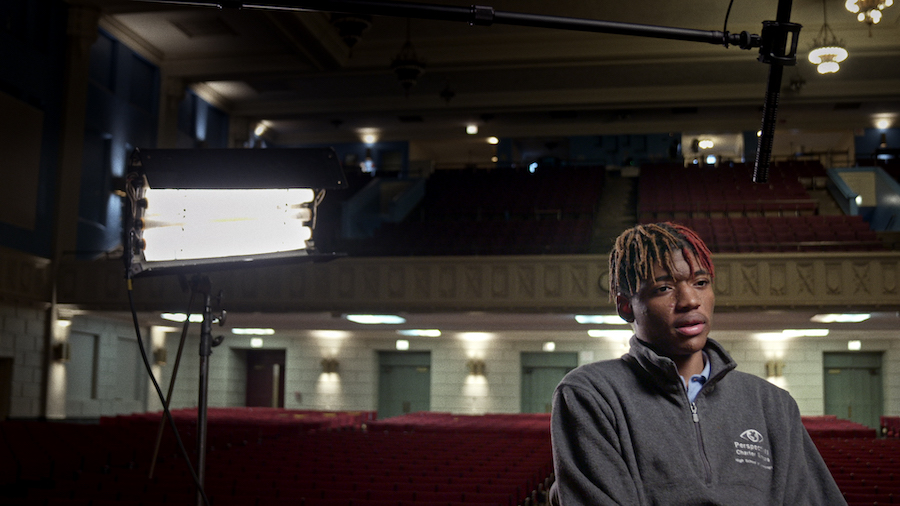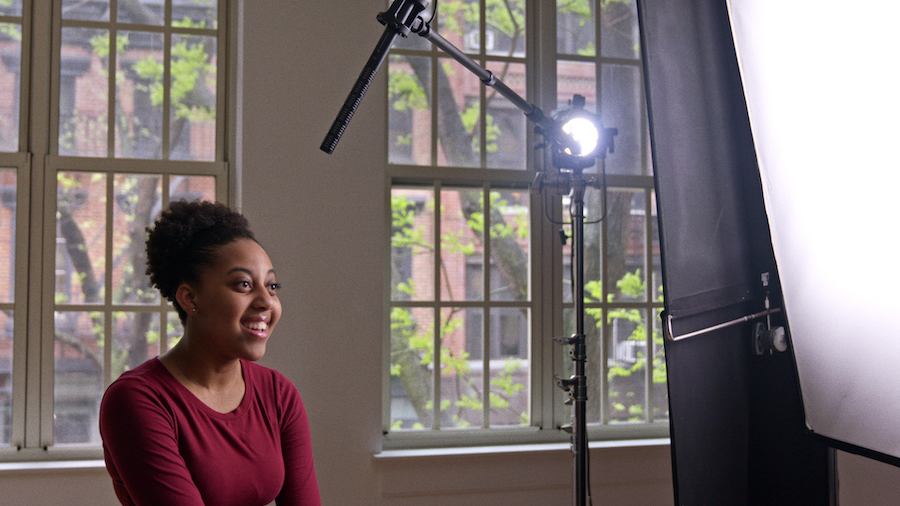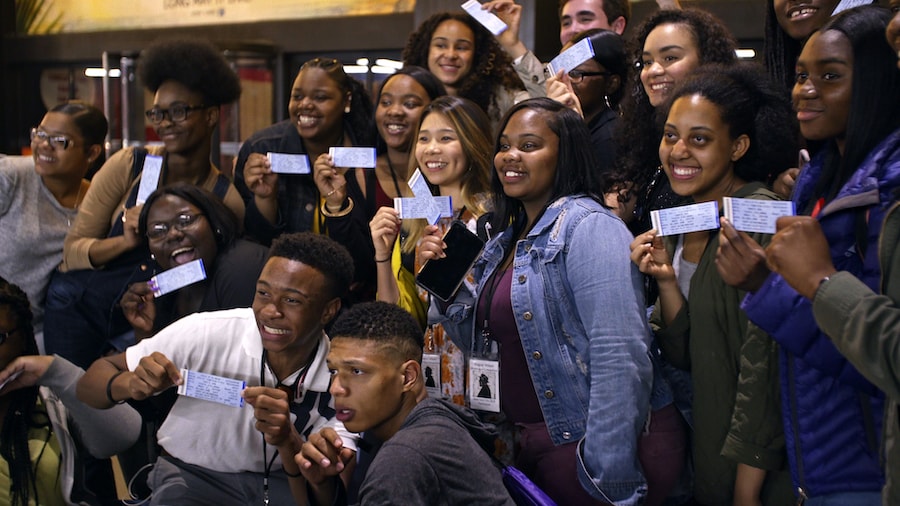Each year, thousands of hopeful high school theatre students from 12 cities across the country compete in the August Wilson Monologue Competition. The initiative was established after Wilson’s death in 2005 with the aim of introducing new generations of theatre students to the preeminent playwright’s oeuvre. The months-long competition, which culminates with a final contest at the August Wilson Theatre in New York City, is a bellwether for Wilson’s lasting legacy. This annual high-stakes event is captured in Netflix’s Giving Voice, a Sundance Award-winning documentary that follows six students as they vie for a spot on the Broadway stage. Viola Davis and John Legend served as executive producers.
“One of the things that really attracted us to making this movie was that it was about a competition that wasn’t necessarily a competition,” says co-director Fernando Villena (he/him), noting that the process throughout was very collegial. “There’s an element that I was also really attracted to in the beginning, which was just the craft of acting and seeing how empowering the craft is to learn.”
The film offers a soup-to-nuts look at the 2018 August Wilson Monologue Competition, from the students first learning about the opportunity to selecting their audition materials, and through the statewide, regional, and national competition rounds. Along the way, the documentary includes vignettes of August Wilson’s history and past productions, as well as interviews with some of the world’s greatest interpreters of his work, including Viola Davis, Denzel Washington, Julius William Tennon, and Stephen McKinley Henderson, among others.
Telling the story of this sprawling, multi-city project was no easy feat. The L.A.-based filmmakers decided to base their work in two “hero cities,” L.A. and Chicago. Another challenge for the directors was gaining the trust of the students, their teachers, and their families. “You have to have the trust of your subject so that they can be honest,” says co-director James D. Stern (he/him), who is also a Broadway producer. “In this case, you know, some of the stories that they had were complicated—they need to trust you to speak openly about their life experiences.”
Anyone who has attended the Nationals competition at the August Wilson Theatre can attest to the outstanding talent onstage—I’ve been three times and was brought to my feet at each curtain call. The students’ connection to the material is clear, even if the characters they are portraying are often 40 years their senior. Giving Voice dives into those connections and explores the effect Wilson’s work has on the young contestants today.
The six contestants featured in Giving Voice offer a variety of experiences, from students in cutthroat performing arts programs to others in schools without theatre clubs, from contestants in the statewide round to some finalists who make it to New York City.

Cody Merridith (he/him), a student from the Auburn Gresham of Chicago, didn’t have access to any sort of arts programming at his high school. It was his English teacher who told him about the August Wilson Monologue Competition. “He told us he wanted us to dive deep into August Wilson and define ourselves within his words and find ourselves within his stories,” recalls Merridith. “He really encouraged us to read the plays in the Century Cycle.”
For the competition, Merridith selected a speech from King Hedley II. “I chose to do King Hedley II’s monologue about Pernell; it is a very expressive monologue,” says Merridith. Having cameras capture his journey through the preparation process for the competition was exhilarating. “It added extra fuel to the fire,” he says.
“To see someone like Cody find his voice on camera by learning the craft of acting was a real gift to the film, because you actually see him figure out that he has all that potential and power,” says Villena.
Meredith credits Wes Lipman, one of the film’s editors, for helping him to tap into his potential. “He’s very insightful and he was very patient with me,” says Merridith. “He taught me patience. He made me look at what was more important and at the bigger picture—he made me look at what August was doing for me in the long run.”
Fueled by the experience, Merridith’s future points to a career in acting. “I’ve been finding a place where I fit as an actor and basically mapping out where I want to be,” says Merridith. “I plan to pursue acting in school.”

Contestant Callie Holley (she/her), now a junior at New York University’s Tisch School of the Arts, was instantly drawn into Wilson’s body of work. “I started researching and fervently reading all of these monologues, and just felt that the words felt so familiar,” she says about preparing for the competition. “I felt that they sounded like my family—they sounded like my mom and my uncle.”
Holley’s journey with the competition took her from Houston to New York City, where the competition turned collegial. “By the time I got to Nationals, I was just so overwhelmed with excitement that not much else was on my mind,” effuses Holley. “The nervousness that I had experienced in the earlier rounds of the competition at regionals and statewide…all of that nervousness faded away.”
The contestants sit in a semi-circle onstage for the final competition, observing and cheering each other on. Even three years on, Holley remains close with the other students, who frequently connect through a group chat. “It’s really a testament to August Wilson’s words and his work, how they really can bring people together,” she says. The whirlwind experience in New York, which included trips to Broadway performances, bonded the students. “It was truly magic.”
Indicative of the film’s title, the biggest takeaways from the students who participated in the 2018 competition was that Wilson’s work helped them to find their own voice.
“This entire experience has been so pivotal in me stepping into who I am as a young person, as a woman, as a Black person, and finding where identities intersect,” says Holley. “As a young artist to be told that your voice is valid, that your experiences deserve to be on Broadway, and that people who speak like you are portrayed in plays, and those words are worthy of a Pulitzer Prize…all of those lessons are not without depth, and they don’t go over your head. That entire weekend was just so validating.”

The lessons of Giving Voice weren’t just for the students involved. The young people gave director James Stern a renewed “sense of optimism,” he says, “which is something I sorely lack. Now it is embedded in my heart, and I think that is incredible.”
Giving Voice will also offer a crash course for viewers unaware of Wilson’s monumental works—a real TV moment for the playwright, further boosted by the release of Netflix’s Ma Rainey’s Black Bottom, starring Viola Davis in the eponymous role. When Giving Voice began production three years ago, the release with Ma Rainey’s was not part of the plan. But as the films neared post-production, it was a fortuitous opportunity to make them a sort of package deal. “There was definitely an intentionality to have the two films within spitting distance of each other,” says Stern, noting that the team interviewed Denzel Washington for the documentary from the set of Ma Rainey’s.
Ma Rainey’s also gave the students an opportunity to see Wilson’s words in a full-fledged production. “One of my favorite actors, God rest his soul, Chadwick Boseman, was an amazing talent,” says Merridith. “I was so excited to see the film and to see him express himself. He was on another level, and I really look up to him.”
The timing of Giving Voice’s release also seems pertinent to the happenings of 2020. “An incredible factor in all this is that the film started three years ago, and for it to be finished and coming out this year—this year of social focus, and Black Lives Matter and its incredible renewed concentration is pretty magical,” says Stern. Holley adds: “This film gives so much hope for the moment that we’re in. August Wilson’s work offers answers to so many of the things that we’re dealing with in society right now.”
The “Wilsonian Soldiers”—a loving moniker Kenny Leon gives to the contestants in the Nationals competition—gathered on Zoom last week to celebrate the film’s release. Holley looks forward to a socially distant screening party at her high school auditorium in Texas next month. Her sister has made T-shirts and pins adorned with a photo of Callie standing in Times Square for the occasion.
In a year where many arts programs and school performances were halted because of the coronavirus, Giving Voice is a testament to the need for arts education in the lives of young people—especially in challenging times. Stern and Villena hope that the film will inspire teachers to add Wilson to their curricula, and for students to want to participate in future August Wilson Monologue competitions. “Arts education is so important to me, and it really meant a lot to shine a light about how important it was for the kids and how much it affected their lives,” says Stern.
Allison Considine (she/her) is senior editor of American Theatre. aconsidine@tcg.org


